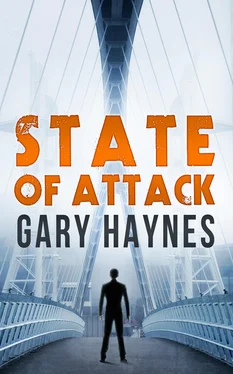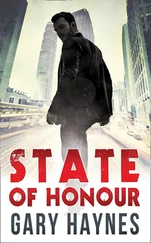1 ...6 7 8 10 11 12 ...17 This was an Alevi sector of the city. Filthy heretics, he believed, whose women wore Western clothes and prayed with their men. But within a few minutes the sedate Ankara scene would descend into a man-made hell.
He opened a copy of Zaman, the popular Turkish newspaper, and feigned reading the business page. There were four other people sitting in the café, a couple of old men, their faces streaked with deep lines like unironed T-shirts, a smart-suited professional woman, who smelt of lavender, and the pot-bellied owner. Ibrahim was six-foot two, so sitting made him less conspicuous. He knew that many Western intelligence agencies refused to employ a surveillance operative over five-eleven for just that reason.
He’d entered the country via Cologne under a forged passport, assuming the identity of a Muslim child who’d died at birth in that German city. Many Turks lived and worked there, and he’d been one of over a hundred who’d flown into Ankara’s Esenboğa Airport. Despite what he was about to do, he felt safe; untouchable, even.
He felt a tug on his suit sleeve, and peered down. A little girl was standing next to him, her wide, luminous eyes desperate to convey hope. But there was no hope there, he thought, just a form of dulled resignation. She was barefoot; her olive-green dress dirt-stained and frayed. He guessed her hair hadn’t seen shampoo for a month, and her fingernails looked like a coal miner’s. She was a gypsy girl, no more than seven years old, and he wanted her gone from the area. The truck bomb he was going to detonate would cause havoc. He didn’t kill little girls when he had a choice in the matter. Little Sunni Muslim girls, at least, as most Turkish gypsies were.
He checked his heavy wristwatch. He had time to spare.
She held out her hand, begging, but said nothing. Ensuring no one was paying attention he folded the paper and slapped her face with it, just hard enough to cause involuntary tears without leaving the skin marked. She turned and ran. He watched her until her fragile frame had reached the sidewalk proper and had crossed the narrow street at the square’s perimeter, her dark curly hair becoming lost among the crowds on the other side. When he was sure that she was out of harm’s way, he allowed himself a faint smile.
The bomb had been placed in a large wooden crate, which lay now on the bed of the stationary flat-back truck, covered with a heavy-duty tarp. There was no possibility of planting a bomb onto the chassis of the limo itself. Even if his associates could’ve arranged clandestine access, the chassis and wheel arches would have been checked regularly with mirrors, and an onboard bomb-detection system would have picked up anything that had been missed, as it scanned for magnets and noise signatures. A detached bomb had been the best option.
He would sit and wait, as if he was just another Turkish intellectual reading a newspaper and sipping the strong coffee; just another man shaded from the intense sunlight enjoying people-watching. But in reality he was about to become the most dangerous man alive, and one day, a day that was fast-approaching, after what he said was this somewhat irritating if necessary act, the world would know that, too.
Chapter 12
Tom had taken a lukewarm shower in his first-floor bathroom and had put on sweatpants and a T-shirt. He walked downstairs now and out of the kitchen door into the conservatory that ran almost the length of the back of the property and housed his sensitive bonsai trees. He had six inside, planted in ceramic pots, and a dozen outside, the hardy perennials.
There were weeping figs, Californian redwoods, junipers, Black Hills spruce, and bald cypress. He’d spent the last two years doing his best to re-create what he considered the greatest bonsai of them all, an imitation of the five-needle pine. The original, some five hundred years old, was one of the National Treasures of Japan and was documented as having been cared for by a Shogun.
Stepping forwards to a wooden table, he unfurled a cloth wrap-around and stared at his collection of bonsai tools. They were held in place neatly by their individual pockets, like an electrician’s kit: the leaf trimmer, the root hook, the branch bending jacks, and the concave cutter. The bon referred to the tray-like ceramic pot, with drainage holes, in which the miniature trees grew. The sai meant cultivation. The pot confinement kept the trees small, together with regular pruning of the roots and crown. The bending jacks were used to create the hanging branches effect.
His five-needle pine was on a bed of coarse sand and Akadama clay pellets, imported from Japan. He breathed in, began to prune the branches, taking particular care, as excessive pruning could kill the tree. Twenty seconds later, he wrapped some copper wire around the trunk and used a length to connect two branches. Then he watered it: a growing work of art.
That done, he walked back out of the kitchen to the living room and settled down on his ox-blood sofa, with a book of Picasso paintings in his hands. After flicking through a few pages, he focussed on Woman Ironing. Truth be told, he always focussed on this representation of the Spaniard’s masterpiece. He’d seen the original in the Venetian Hotel’s Guggenheim gallery in Vegas ten years back. It’d lingered in his mind like an exotic view experienced on a vacation, or the face of some former girlfriend.
The painting was superficially mundane, the colours of an overcast day, and had hung on the gallery’s steel outer wall via magnets. Painted in the master’s Blue Period, it was the study of a near-emaciated young woman hunched over a heavy iron, pressing a shirt. The woman appeared to be worn out. A sympathetic portrayal of the exploited poor, he’d read; a study in melancholy. Looking intently at it now, she reminded him of his mother.
He stood up and walked over to his drinks cabinet and fixed himself a Jack Daniel’s and Coke. No ice, about three fingers’ worth. Sipping his drink, he realized he had to focus on the living rather than the dead. After he’d gotten a little closer to his father, he’d questioned him about Dan Crane, the enigmatic CIA operative who’d watched his back as he’d tracked down the Secretary of State after she’d been kidnapped in Islamabad thirteen months ago.
His father had told him that he’d gone to Beirut to rescue Crane from Hezbollah in the eighties, and, unofficially, had paid for his release. Crane hadn’t given away the general’s identity to his kidnappers, so the general couldn’t give up on him, either. It was a code of honour between men and women who risked their freedom and lives on a regular basis, Tom knew.
Tom’s next assignment was a so-called mannyguarding, the close-protection of a foreign diplomat’s child, and he was getting sick of it. Crane had offered him a job in the clandestine services provided by the CIA after he’d been responsible for saving the secretary, and, taking a hearty slug of the Jack and Coke, he knew that that was getting more appealing by the day.
He looked over at the book once more, at the Woman Ironing . His mother was dead; it had been a shitty life in the years between his father leaving and her death. But bitching about it to the man who hadn’t even left him with his surname would mean he would become a sullen bore, and Tom had resolved to make things right between them.
Chapter 13
The general had reported to the Pentagon on the position regarding the likely protection of Ibrahim by the Turkish mafia and the Muslim terrorist groups via a secure satphone a couple of minutes ago. He’d left Habib’s office and had snuck into a nearby alcove, anxious neither to be seen nor heard. Now, after stepping out of an old-fashioned cage elevator, he walked across the dull grey flagstones to the revolving exit doors, nodding to the two plainclothes operatives sitting behind a desk to the right beneath a wide staircase.
Читать дальше












